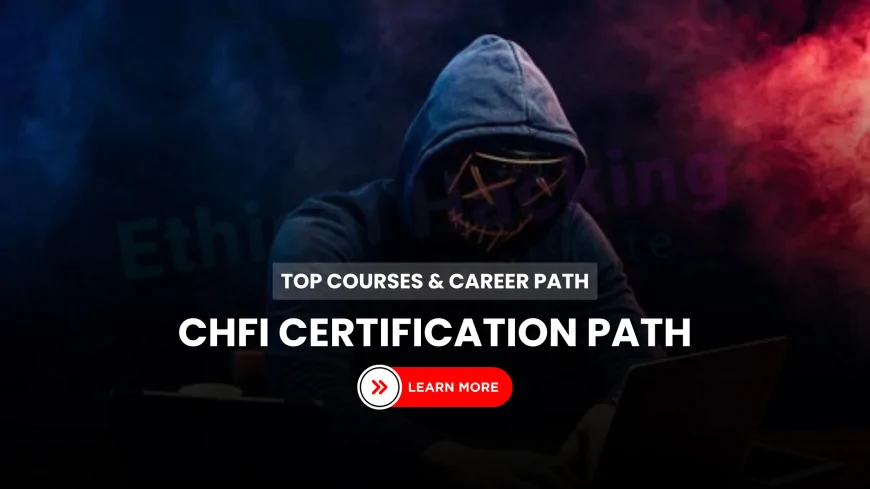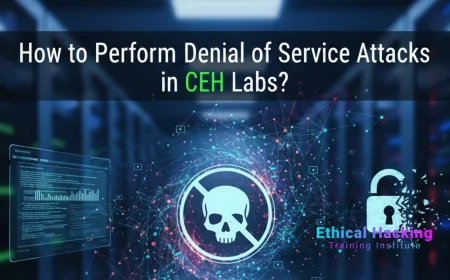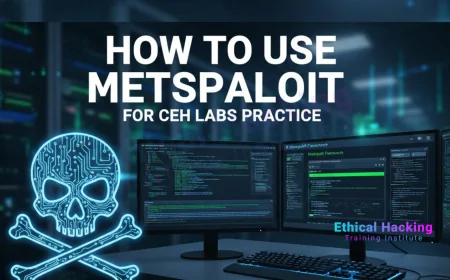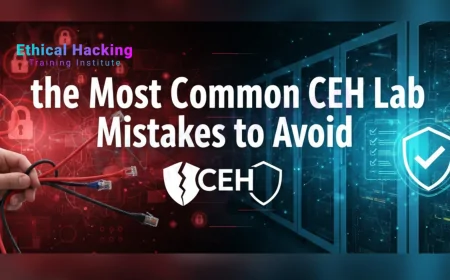Become a Certified Hacking Forensic Investigator: Top Courses and Certification Path | Certified Hacking Forensic Investigator (CHFI): Courses and Certification Guide
Explore top CHFI courses and learn how to become a Certified Hacking Forensic Investigator. Build a career in digital forensics with expert guidance.

Table of Contents
- Why Choose a Forensic Investigator Career?
- Key Certifications: CHFI & Beyond
- Top CHFI Courses (Bootcamp, Online, Self‑Paced)
- Course Contents & Learning Outcomes
- Forensic Tools Covered
- Training Formats Compared
- Cost and Time Investment
- Exam Registration & Preparation
- Hands‑On Training & Labs
- Career Pathways & Roles
- Salary & Market Demand
- Continuing Education & Advanced Training
- Success Stories & Case Studies
- How to Choose the Right Provider
- Preparation Tips Before You Start
- Future Trends in Digital Forensics Training
- FAQs
- Conclusion
Why Choose a Forensic Investigator Career?
In today's digital age, cybercrimes are increasing in scale and sophistication. Every breach, ransomware attack, data theft, or insider threat leaves behind digital footprints that only trained professionals can properly analyze. That’s where Computer Hacking Forensic Investigators (CHFI) come in. They play a critical role in uncovering what happened, who was responsible, and how systems can be better protected.
A career in digital forensics offers not just technical challenges but also legal and investigative work, making it uniquely rewarding. Forensic investigators often collaborate with law enforcement, cybersecurity teams, legal departments, and corporate executives to deliver high-stakes digital evidence in real-world cases.
Top Reasons to Choose a Career in Digital Forensics:
- High Demand: With growing cyber threats, organizations urgently need certified forensic experts who can respond quickly and accurately to incidents.
- Attractive Salaries: Forensic analysts and CHFI-certified professionals often earn above-average salaries, especially in banking, government, and security sectors.
- Global Career Opportunities: Forensic skills are universal—applicable across industries and borders, from police departments to tech giants.
- Impactful Work: Your investigations may solve crimes, recover lost data, or prevent millions in losses—making your work incredibly meaningful.
- Job Security: Digital forensic investigation is a highly specialized skill, making professionals less likely to be replaced by automation.
Whether you’re transitioning from IT, working in law enforcement, or starting a cybersecurity career, becoming a certified forensic investigator can elevate your role and position you at the heart of modern cyber defense and justice.
Key Certifications: CHFI & Beyond
While EC-Council’s CHFI is the benchmark for hacking forensic training, other advanced certs include:
- GIAC Certified Forensic Analyst (GCFA)
- GIAC Certified Forensic Examiner (GCFE)
- OSCP (with forensic modules)
- CFCE / CCE (Law Enforcement standards)
- CISCO CyberOps Associate
Top CHFI Courses (Bootcamp, Online, Self‑Paced)
The best CHFI courses offer:
- Bootcamps: 5–7 days of immersive, instructor-led training
- Live Online: 6–12 weeks of scheduled virtual classes
- Self-Paced: Flexible video modules and labs under your control
Leading providers include EC‑Council, Firebrand, Simplilearn, Infosec, and local training centers—all offer official or authorized CHFI paths.
Course Contents & Learning Outcomes
Common CHFI modules include:
- Cybercrime investigation and digital evidence basics
- Disk, memory, network, mobile, and cloud forensics
- Malware analysis and timeline construction
- Report writing, chain of custody, legal compliance
Forensic Tools Covered
- EnCase, FTK, X-Ways, Autopsy
- Volatility, Wireshark
- Cellebrite, Oxygen Forensic
- Cloud forensic tools like AWS/Azure forensic suites
Training Formats Compared
| Format | Duration | Cost | Best For |
|---|---|---|---|
| Bootcamp | 5–7 days | High | Fast track learning |
| Live Online | 6–12 weeks | Medium | Interactive, flexible |
| Self-Paced | Up to 6 months | Low | Budget and time-flexible |
Cost and Time Investment
On average:
- Bootcamp: $1,500–3,500 (₹120k–250k) + 1–2 weeks
- Live Online: $1,200–2,500 + 6–12 weeks
- Self-Paced: $600–1,200 + 2–6 months
Exam Registration & Preparation
Steps:
- Buy voucher via EC‑Council or training bundle
- Enroll in paid or free preparation materials
- Simulate timed tests
- Schedule remote/in‑person proctored exam
Hands‑On Training & Labs
Theoretical knowledge is essential, but mastering digital forensics requires hands‑on experience. That’s why top CHFI and computer forensic courses integrate practical labs that simulate real-world cyber incidents and investigations.
These labs help learners understand how to:
- Capture and analyze disk images
- Recover deleted files and emails
- Investigate memory dumps for hidden malware
- Perform timeline analysis of digital activity
- Extract evidence from mobile, cloud, and network systems
- Maintain proper chain of custody and legal documentation
Popular Lab Platforms
- EC-Council iLabs: Cloud-based labs offered with official CHFI courses; includes 100+ forensic exercises, real hacking scenarios, and live virtual machines.
- Autopsy Case Labs: Open-source platform used to analyze file systems and metadata for digital investigations.
- Volatility Lab: Focuses on memory forensics—ideal for malware detection and system breach analysis.
- Simulated Incident Response Environments: Used by training partners like Firebrand, Infosec, and Cybrary to replicate enterprise-scale investigations.
Quality training providers will offer labs with:
- 24/7 cloud access to lab machines
- Step-by-step guides and challenges
- Sandboxed environments for testing tools safely
- Evidence reporting practice to prepare for the real world
Why Hands-On Labs Matter
Digital forensics is about more than tools—it’s about thinking like an investigator. Hands-on labs develop your ability to detect anomalies, extract meaningful evidence, and present findings that are admissible in court. They also give you an edge in job interviews, as employers look for candidates who can hit the ground running.
If you’re comparing CHFI or related courses, always confirm lab availability, lab hours, and whether lifetime access or post-training usage is included.
Key SEO Points Covered:
-
Lists practical forensic skills learned through labs
-
Mentions leading lab platforms like iLabs and Autopsy
-
Emphasizes job-readiness and evidence-handling
-
Includes tool-specific and scenario-based practice
Career Pathways & Roles
- Digital Forensic Analyst
- Incident Response Specialist
- Cybercrime Investigator
- eDiscovery Consultant
- Malware & Memory Analyst
Salary & Market Demand
Typical salaries:
- India: ₹6–15 LPA
- Global mid-career: $70K–120K
- Senior roles: $120K–150K+
Continuing Education & Advanced Training
Becoming a Certified Hacking Forensic Investigator (CHFI) is just the beginning of your professional journey in digital forensics. To stay current with emerging threats and maintain your certification status, continuing education and advanced training are essential.
Why Continuing Education Matters
- Cyber threats evolve rapidly—from deepfakes to fileless malware, staying informed is critical.
- Required for certification renewal: CHFI holders must earn Continuing Professional Education (CPE) credits to renew every 3 years.
- Boosts career progression: Learning advanced techniques opens up leadership, consulting, and specialized forensic roles.
Ways to Earn CPE Credits
- Attending cybersecurity webinars, summits, and conferences
- Publishing blog posts, papers, or training others in forensic techniques
- Completing additional certifications or courses
- Participating in community events or CTFs (Capture the Flag challenges)
Recommended Advanced Certifications After CHFI
- GIAC Certified Forensic Analyst (GCFA): Ideal for memory forensics and advanced incident response
- GIAC Certified Forensic Examiner (GCFE): Focuses on email, browser, and Windows forensics
- EnCase Certified Examiner (EnCE): For professionals using OpenText EnCase tools
- Certified Cyber Forensics Professional (CCFP): ISC²’s deep forensic certification for senior-level investigators
- Mobile and Cloud Forensics Training: From SANS, EC-Council, and vendor-specific programs
By actively participating in continuing education, CHFI-certified professionals not only renew their credentials but also position themselves as leaders and innovators in the field of cyber forensics.
Success Stories & Case Studies
“I completed CHFI bootcamp within 7 days and got hired as a forensic analyst at a security firm in Bangalore.” – Rohan
“Self-paced CHFI and GCFA combo landed me a government investigator role.” – Anjali
How to Choose the Right Provider
- Official EC‑Council accreditation
- Hands-on lab quality and access duration
- Instructor credentials and post-course support
- Alumni reviews and pass rates
- Refunds, retake policy, and pricing transparency
Preparation Tips Before You Start
- Brush up OS and networking fundamentals
- Test basic forensic tools ahead of training
- Set aside regular lab hours
- Engage with DFIR communities (Reddit, SANS, GitHub)
Future Trends in Digital Forensics Training
- AI-powered forensic analysis
- Mobile, cloud, and IoT forensics expansion
- Real-time incident response simulations
- Integration with threat intel and cybersecurity ecosystems
FAQs -
1. What is CHFI?
CHFI stands for Computer Hacking Forensic Investigator, a certification from EC‑Council.
2. Is CHFI the only forensic certification?
No—others include GCFA, GCFE, CFCE, OSCP (forensics tracks).
3. Which course format is best?
Bootcamp is fast; live online offers interaction; self-paced is budget-friendly.
4. What tools do I learn in CHFI?
Tools include EnCase, FTK, Autopsy, Volatility, Cellebrite.
5. How long does self-paced take?
Typically 2–6 months depending on your schedule.
6. What’s the cost for training?
Ranges from $600 to $3,500 depending on format and provider.
7. Are labs included?
Quality courses include virtual labs; confirm access duration.
8. How do I register for the CHFI exam?
Purchase voucher via EC‑Council or bundled course and schedule proctored exam.
9. Is CHFI globally recognized?
Yes—it is accepted by cybersecurity industries and law enforcement worldwide.
10. Does CHFI require renewal?
Yes—certification lasts 3 years and needs CPE credits for renewal.
11. What career roles can CHFI lead to?
Roles include forensic analyst, incident responder, threat investigator, eDiscovery specialist.
12. What’s average salary after CHFI?
Approximately ₹6–15 LPA in India; $70K–120K globally for mid-level positions.
13. Can I take CHFI while working?
Yes—self-paced and live online formats accommodate working professionals.
14. Are there free CHFI resources?
EC‑Council offers occasional webinars; open-source tools can supplement learning.
15. Should I take CHFI before or after CEH?
Either order works—if you’re into analysis, start with CHFI; for offense, begin with CEH.
16. How to prepare for labs?
Practice disk imaging, memory dumps, timeline analysis, and writing coordinator reports.
17. What if I fail the exam?
You can retake; policies vary—some bundles include free retake.
18. Is CHFI good for career changers?
Yes—especially for IT pros aiming to specialize in security.
19. How to choose a provider?
Choose accredited providers with strong labs, instructor track record and positive reviews.
20. What’s the future of forensic training?
Advances include AI-powered labs, IoT/cloud focus, and immersive cyber-incident simulations.
Conclusion
Choosing a forensic investigator career through CHFI and related certifications can be highly rewarding—financially and professionally. Select a training path that matches your learning style, invest in quality labs, and commit to continuous upskilling to thrive in this evolving field.
What's Your Reaction?
 Like
0
Like
0
 Dislike
0
Dislike
0
 Love
0
Love
0
 Funny
0
Funny
0
 Angry
0
Angry
0
 Sad
0
Sad
0
 Wow
0
Wow
0
















